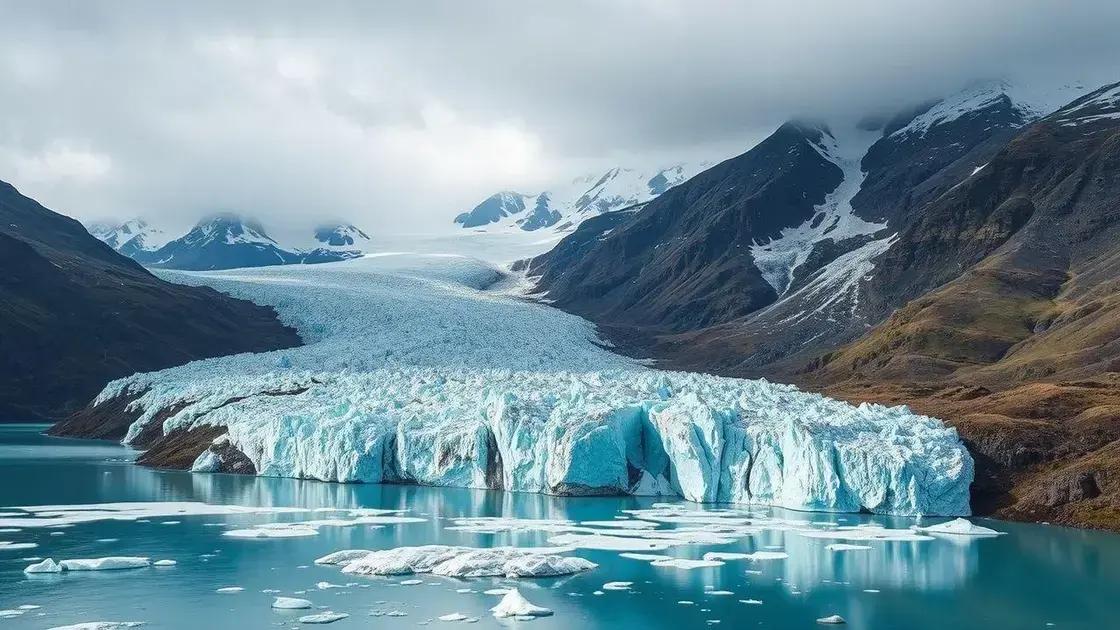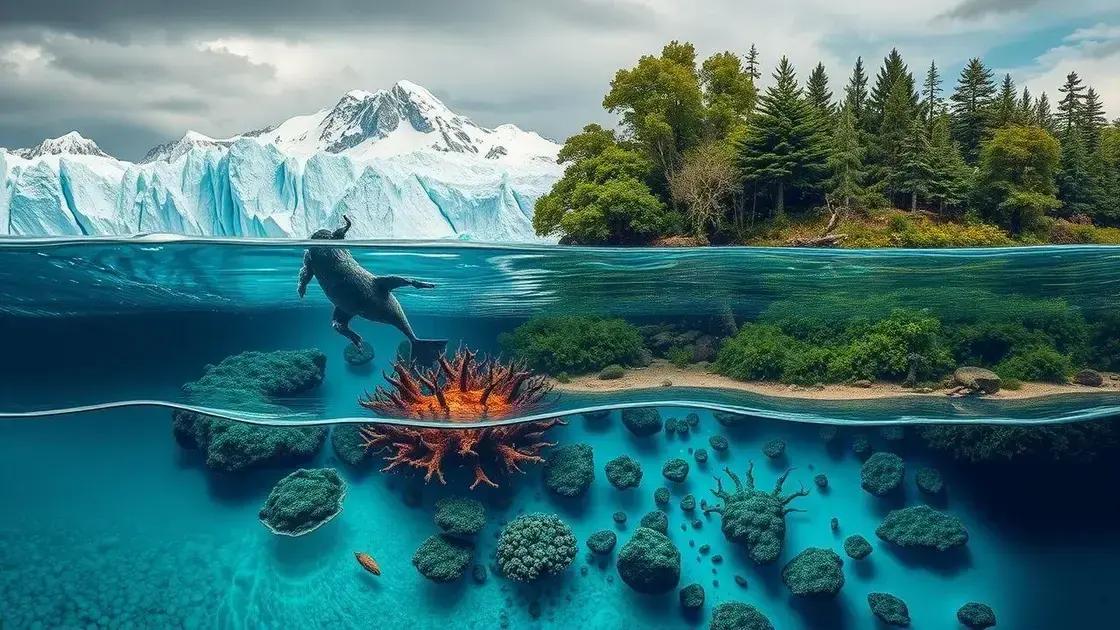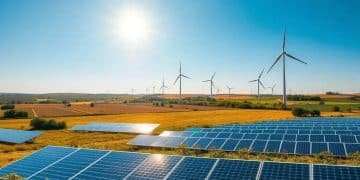Climate change news: urgent updates you shouldn’t miss

Anúncios
Individuals can significantly contribute to climate action by reducing waste, conserving energy, using sustainable transportation, and supporting climate-friendly policies to mitigate the effects of climate change.
Climate change news is constantly evolving, shaping our world and influencing day-to-day life. Have you noticed unusual weather patterns recently? This article digs into the latest updates that affect us all.
Anúncios
Current global climate trends
Current global climate trends are shaping our world in significant ways. Understanding these trends helps us grasp the challenges we face and the paths we can take to address them. Scientists observe a variety of changes that reflect the urgent need for action.
Rising Temperatures
Global temperatures have increased at an alarming rate. This rise impacts ecosystems, weather patterns, and sea levels. Each year, new records are set, demonstrating the seriousness of the situation. The following factors contribute to the overall warming:
Anúncios
- Increased greenhouse gas emissions
- Deforestation
- Industrial activities
- Urbanization
Furthermore, these factors create a vicious cycle. As temperatures rise, polar ice melts, leading to even more greenhouse gases being released.
Changing Weather Patterns
An additional concern is the shift in weather patterns. Regions that once experienced mild climates now face extreme weather events. Storms become more severe, droughts increase, and flooding becomes common. These changes lead to dire consequences for food production and water supply in many areas.
Climate change indicators are evident globally. For example, the increase in frequency and intensity of hurricanes showcases how natural disasters are evolving. It’s crucial for individuals and governments to recognize these trends.
Impact on Biodiversity
Biodiversity is also at risk due to changing climates. Many species are struggling to adapt to new habitats or altered ecosystems. As some species thrive, others face extinction, threatening the balance of natural habitats.
Engaging in climate-friendly practices can enhance biodiversity. This can range from sustainable agriculture to protecting natural reserves.
Impact of climate change on ecosystems

The impact of climate change on ecosystems is profound and far-reaching. Various species and their habitats are changing rapidly, prompting us to take notice. Every ecosystem, from the deepest oceans to the highest mountains, feels the effects of rising temperatures and altered climates.
Shifts in Habitat
One major impact of climate change is the shift in habitat for many species. Animals and plants are forced to migrate in order to survive. For instance, some birds and mammals move toward higher altitudes or latitudes in search of suitable climates. As they relocate, the interacting species in these new habitats face disruption.
- Species that cannot adapt quickly may face extinction.
- The balance of local ecosystems is jeopardized.
- New predator-prey relationships can develop, leading to unexpected consequences.
These changes can lead to a loss of biodiversity, which is crucial for a healthy planet. For example, coral reefs, which support a vast array of marine life, are severely affected by rising ocean temperatures and acidification.
Altered Interactions
As ecosystems shift, the interactions among species are also disrupted. Pollination, nutrient cycling, and food webs can all be affected. When certain plants bloom earlier due to warmer temperatures, it can lead to mismatches with the animals that rely on them for food. This timing discrepancy can have cascading effects throughout the food chain.
Moreover, invasive species often thrive in changing climates, further endangering native populations. They can outcompete local species for resources, disrupting the natural balance. These invasions contribute to the decline of indigenous flora and fauna, making ecosystem recovery more challenging.
Climate Resilience
Despite these challenges, some ecosystems showcase resilience. Wetlands and forests can act as buffers against the extreme effects of climate change. They store carbon, reduce flood risks, and provide habitats for countless organisms. Protecting these resilient ecosystems is key to combating climate change effects.
Community involvement and conservation efforts play a critical role in this area. Local actions can enhance habitat protection and restoration, fostering ecosystems capable of withstanding climate adversities.
Innovative solutions to combat climate change
Innovative solutions to combat climate change are emerging as vital strategies to address this global crisis. As the effects of climate change become more apparent, it is crucial to explore creative and effective methods that individuals, communities, and governments can implement.
Renewable Energy Sources
One of the most promising solutions lies in the shift towards renewable energy. Solar, wind, and hydroelectric power are becoming increasingly efficient and cost-effective. By using these sources, we can significantly reduce our carbon footprint. Some key benefits of renewable energy include:
- Decreased dependence on fossil fuels
- Lower greenhouse gas emissions
- Stimulation of local economies through green jobs
Adopting renewable energy not only helps combat climate change but also fosters sustainable development.
Sustainable Agriculture Techniques
Another innovative approach is sustainable agriculture. Techniques such as crop rotation, organic farming, and permaculture promote soil health and increase biodiversity. These methods help in reducing the carbon emissions associated with traditional farming practices. Additionally, community-supported agriculture (CSA) initiatives are gaining popularity, allowing consumers to connect directly with local farms. This not only supports local economies but also reduces transportation-related emissions.
By enhancing local food systems, we can both support farmers and minimize our environmental impact.
Reforestation and Afforestation
Reforestation and afforestation are powerful tools to combat climate change. Planting trees can absorb large amounts of carbon dioxide from the atmosphere. Initiatives aimed at restoring damaged forests and creating new forested areas play a critical role in maintaining biodiversity and providing habitats for many species.
Additionally, urban greening projects, such as creating parks and gardens, contribute to carbon sequestration while improving community well-being.
Technological Innovations
Innovation in technology also leads to viable solutions for climate action. Carbon capture and storage technologies directly reduce CO2 emissions from industrial processes. Likewise, advancements in energy-efficient appliances and electric vehicles further lessen the climate impact. The integration of smart technologies in homes can optimize energy use, leading to lower consumption.
Investing in research and development is crucial. By prioritizing technologies that promote sustainability, we can develop new solutions that help mitigate the effects of climate change.
How individuals can contribute to climate action

Individuals can play a crucial role in climate action. Each person has the power to make choices that collectively lead to significant changes. By adopting simple yet impactful practices, we can help mitigate the effects of climate change.
Reduce, Reuse, Recycle
One of the most effective ways to contribute is by focusing on reducing waste. Follow the reduce, reuse, recycle mantra. This can mean cutting down on single-use plastics and opting for reusable bags and containers. Every item saved from the landfill helps decrease greenhouse gas emissions.
- Choose products with minimal packaging.
- Repurpose items instead of discarding them.
- Participate in local recycling programs.
These actions foster a sustainable environment and encourage others to follow suit.
Energy Conservation
Energy conservation is another vital area where individuals can make a difference. Simple actions can lead to saving significant energy. For example, turning off lights when not in use and unplugging electronic devices can reduce energy consumption.
Consider using energy-efficient appliances. These products use less energy and can lower your utility bills. Additionally, using natural light whenever possible not only saves energy but also enhances the mood in your living space.
Support Sustainable Transportation
Transportation is a major contributor to carbon emissions. Opting for sustainable transportation methods can greatly reduce your carbon footprint. Walking, biking, or using public transportation are excellent choices.
Carpooling when possible is also a great way to save fuel and decrease air pollution. If you can, consider investing in an electric vehicle, as they produce fewer emissions compared to traditional gas vehicles.
Advocate for Climate Policies
Advocacy plays a significant role in climate action. Individuals can support policies that promote sustainability and environmental protection. Stay informed about local, national, and global issues concerning climate change.
Engage with community initiatives that prioritize climate action. Signing petitions, attending town hall meetings, and voting for environmentally-minded candidates can amplify your voice in the fight against climate change.
By participating in these actions, we create a ripple effect, encouraging friends and family to join in and foster a culture of sustainability.
In conclusion, every individual has a role to play in addressing climate change. By adopting simple habits like reducing waste, conserving energy, and choosing sustainable transportation, we can make a significant impact. Supporting innovative solutions and advocating for climate-friendly policies will help create a sustainable future. Together, our actions can lead to meaningful change and contribute to a healthier planet for generations to come. Let’s strive to be part of the solution!
FAQ – Frequently Asked Questions about Climate Action
What are some simple ways individuals can combat climate change?
Individuals can reduce waste, conserve energy, and use sustainable transportation methods such as walking or biking.
Why is renewable energy important for climate action?
Renewable energy reduces reliance on fossil fuels, decreases greenhouse gas emissions, and promotes sustainable development.
How can I support climate-friendly policies?
You can advocate for policies that promote sustainability by participating in community initiatives, signing petitions, and voting for environmentally-minded candidates.
What impact does waste reduction have on the environment?
Reducing waste lessens landfill use, decreases pollution, and helps conserve natural resources, all of which contribute to a healthier ecosystem.






